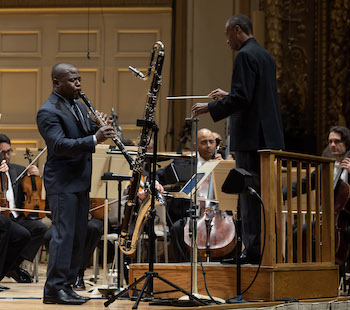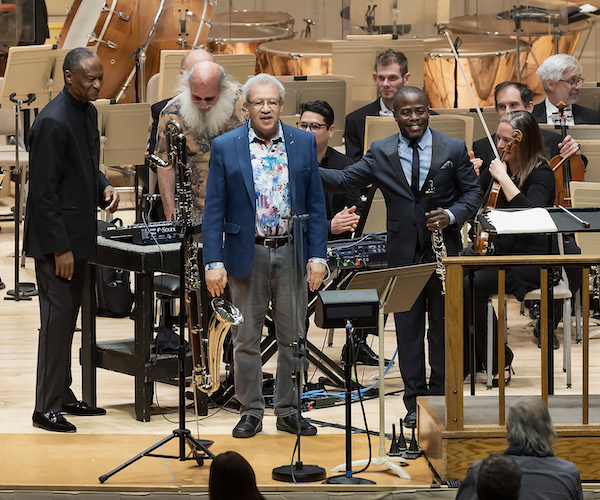Classical Concert Review: The Boston Symphony Orchestra Plays Davis, Dawson, and Bonds
By Aaron Keebaugh
While balancing the scales of justice can be difficult work, the effort is an important act of generosity, even love.

Boston Symphony Orchestra at Symphony Hall, Thomas Wilkins, conductor. Anthony McGill, clarinet. Photo: Winslow Townson.
While driving to a concert in Boston in the late ’70s, composer Anthony Davis suffered a crisis he would never forget.
A policeman pulled him over in an instance of mistaken identity. Though Davis and his wife remained calm as the officer questioned them with gun drawn, the incident haunted the young couple.
The fear and anger Davis still feels over that event forms the essence of his You Have the Right to Remain Silent, a concerto for clarinet and orchestra that soloist Anthony McGill and the Boston Symphony Orchestra performed as part of the Voices of Loss, Reckoning, and Hope festival Thursday night at Symphony Hall. Conducted by Thomas Wilkins, the music generated strong emotions inspired by America’s continued struggle for social justice.
Davis’s music frequently wrestles with similarly difficult subjects. His operas The Life and Times of Malcolm X and Central Park Five deal head-on with issues of racism and activism through music that is at once immediate and powerfully dissonant. Jazz and improvisation are constant themes — the composer is also a free jazz pianist — and his scores recall the thorny harmonies of Charles Mingus, whose work Davis has studied extensively
Such elements make You Have the Right to Remain Silent a vivid musical journey through storm and stasis. Cast in four movements, the score pits the soloist as an innocent protagonist under interrogation by the larger orchestral forces. Much of this music unfolds in astringent lyricism and disjointed phrases: the clarinetist answers fleetingly with lush lines. Elsewhere, the jazz elements take center stage, and the soloist squeaks out multi-phonics — Coltrane-like — in dialogue with a Kurzweil synthesizer, which showers everything in a wash of electronics.
This is a sound world of relentless, unbridled tension. Yet McGill played with control and conviction in all the right places. Bleeps and chirps from Earl Howard’s synthesizer provided an otherworldly touch. On the podium, Wilkins drew a lithe accompaniment from the orchestra that kept everything in ideal balance. The brass played with fervor, while the woodwinds and strings routinely sweetened the texture. And all coalesced in a zesty swing during the jazzy interludes.
William Levi Dawson’s Negro Folk Symphony, which filled the second half of the program, offered another journey from struggle to triumph.
The composer’s only symphony was a hit at its premiere under the baton of Leopold Stokowski and the Philadelphia Orchestra in 1934. But the work soon fell into neglect. The current Black Lives Matter era has thrust renewed attention on Dawson’s score, revealing it to be an attractive essay in grandeur and lyricism.

Boston Symphony Orchestra at Symphony Hall, Thomas Wilkins, conductor, Anthony McGill, composer Anthony Davis. Photo: Winslow Townson
The symphony’s program relays the tribulations of African Americans out of slavery, with hope for a better future resounding in the concluding bars. Wilkins has a firm feel for this music and coaxed an energetic account that displayed the orchestra’s full dimensions. The brass rose to the fore with stentorian force, complementing the sleek string and wind passages in the first movement.
In the second, Wilkins’s steady tempo allowed for the sudden shifts in mood to thunder with outsize force. He eased on the throttle by movement’s end to inject soulful flair.
The vitality that coursed through much of this composition even drew tentative applause between movements. “It’s okay to clap,” Wilkins joked to the crowd, who erupted in an ovation at the fiery conclusion.
Three movements from Margaret Bonds’s Montgomery Variations opened the concert in a lighter vein, at least musically.
Written in response to the bus boycotts and eventual violence that defined Civil-Rights-era Alabama, this music brings solace through a play upon beloved spirituals.
Bonds cleverly weaves each theme into a rich melodic tapestry, and Wilkins vividly casts light on every sonic shape. Warm resonances from the strings framed the first movement’s underlying tension. The conductor’s gentle gestures coaxed elegant solos from oboe, clarinet, and flute in the second. The March ventured from sorrow to untethered joy.
Festival: Voices of Loss, Reckoning, and Hope concludes with next week’s BSO program. The schedule of music performances and panel discussions is an attempt at reckoning with the corrosive racial politics that have shaped classical music. While balancing the scales of justice can be difficult work, the effort is an important act of generosity, even love.
Aaron Keebaugh has been a classical music critic in Boston since 2012. His work has been featured in the Musical Times, Corymbus, Boston Classical Review, Early Music America, and BBC Radio 3. A musicologist, he teaches at North Shore Community College in both Danvers and Lynn.
Tagged: Aaron Keebaugh, Anthony Davis, Anthony McGill, Boston Symphony Orchestra, Thomas Wilkins

Just had an eye-rolling moment watching NPR’s broadcast of the bejeweled audience reopening the NY Phil’s Geffin Hall & hearing them clap between the movements of the Ninth Symphony. I was appalled & have been at all the concerts I attend live. For me, it’s like complimenting a chef on the green beans…and nothing else. Composers, like chefs, spend a lotta time creating an entire experience, balancing one dish (movement) to another. It’s the end result that’s glorious. Maybe a great touchdown even though the team loses is exciting, but compositions aren’t football games. Worse still, some composers’ movements are more exciting than other & clapping for the third movement of Tchaikovsky and not the fourth is just plain embarrassing. Hard to believe, but I’m with Mahler who forbade such nonsense. No cameras, no phone calls, no clapping before the end!